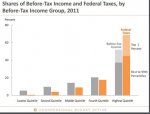- Joined
- Aug 14, 2012
- Messages
- 35,139
- Reaction score
- 26,987
- Gender
- Male
- Political Leaning
- Libertarian - Left
Not a good idea.
Granny that bought her House in San Fran or Manhattan 50 years ago for 40-50k and how has a house valued at 500k or so would not be able to afford this.
Oh, the "old widow" bogey never gets old. :lol:
A deferment/roll-up option can resolve that issue (not that it would be, because Granny is probably already paying property taxes).
Nor would that family farm for 3 generations that has had industry or condos creep up around it.
This is already happening thanks to the urban sprawl that is accelerated by site speculation. LVT alleviates that problem, condensing cities and leaving more land for the farmers (and the wildlife).
You would end up with the very wealthy buying it all up and then just passing on this land value tax to people who leased it because they couldn't own it themselves.
Adam Smith once noted, lvt (or ground rent as he called it) cannot be passed on to tenants. It has no deadweight loss.
Last edited:




